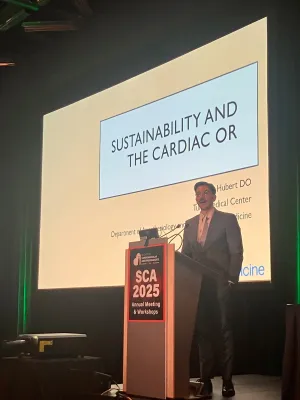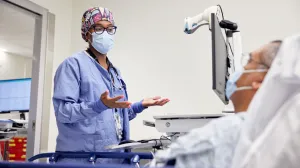
In the opening session, titled Sustainability in the Cardiac OR, Dr. Hubert contributed to the growing global discussion on healthcare’s carbon footprint, spotlighting the under-recognized role anesthesia plays in contributing to climate change.
Globally, healthcare systems are responsible for nearly 5% of total CO₂ emissions. While the biggest contributors to these emissions are the use of disposables and biohazardous waste, a significant portion of this comes from volatile anesthetic gases, which are often released directly into the atmosphere after use, and have global warming potentials thousands of times greater than carbon dioxide.
Focusing on Coronary Artery Bypass Grafting (CABG) surgeries, Dr. Hubert and his research team developed a replicable method to quantify CO₂ emissions in the cardiac OR. After a year of measurements, they found that the carbon footprint of a single CABG procedure was equivalent to driving a typical gasoline-powered car from Orlando to Boston—roughly 1,200 miles.
Quantifying these emissions is a vital first step toward reducing them. Importantly, their work shows that environmental sustainability and patient safety are not mutually exclusive. The research outlines a set of actionable strategies, including:
- Minimizing biohazard waste to essential use only
- Reducing the amount of anesthetic delivered without compromising care
- Lowering oxygen flow rates to cut gas consumption
- Phasing out single-use items where safe alternatives exist
- Investing in gas scavenging and capture technologies for long-term impact
SCA, an international organization dedicated to advancing excellence in perioperative cardiovascular care, hosted its 2025 meeting in Montreal from April 26 to 29. The presentation reflects a broader shift in the field, where clinical excellence increasingly includes environmental responsibility.


